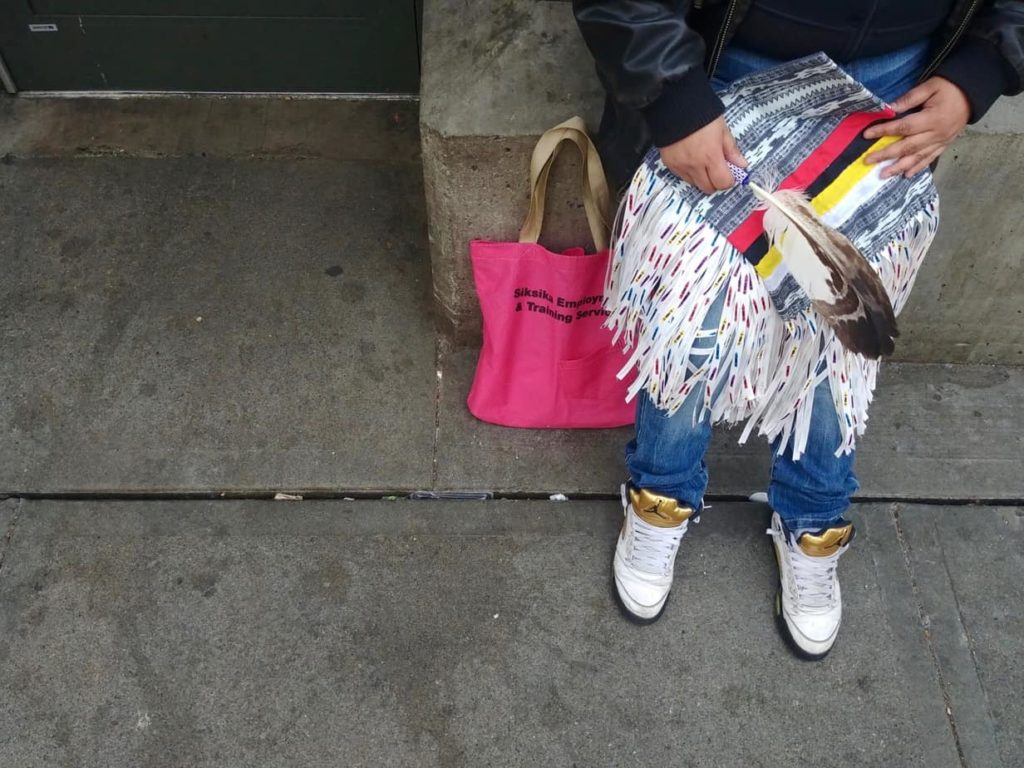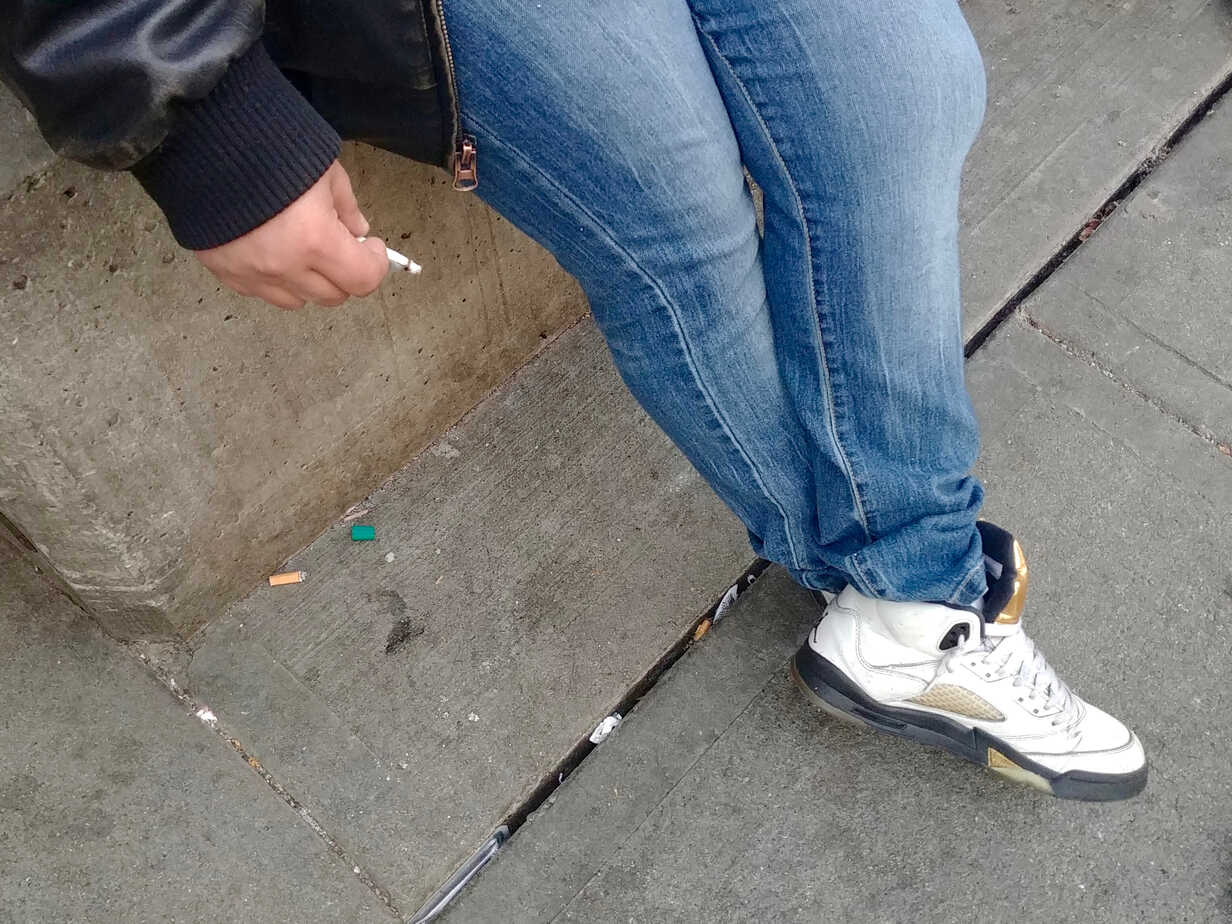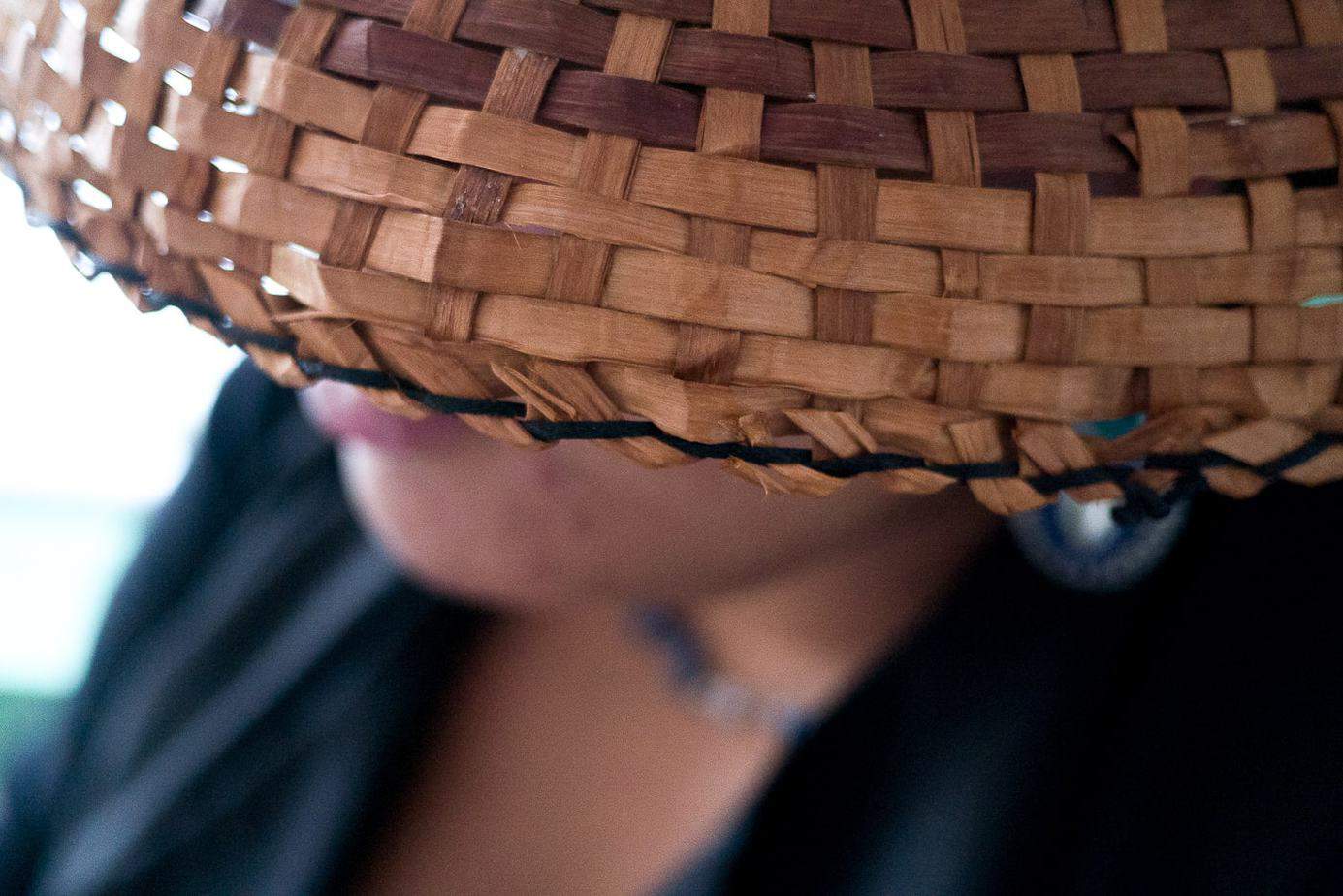
Under the table, Justine’s sneakers bounce up and down while a judge hears arguments about whether she’s fit to raise her four daughters.
Deep in the bowels of Vancouver’s Robson Square courthouse, it’s day one of the trial that will determine whether “Justine” (whose real name The Discourse is withholding to protect her children’s identities) will see her girls returned to her or placed permanently into foster care.
Cases like this are playing out across British Columbia by the hundreds, according to data obtained from B.C.’s Ministry of Children and Family Development. Every year, social workers find 23,500 children are in need of protection, and the ministry applies to permanently remove about 700 of these kids from their families. More than half of these kids are Indigenous.
Many come from families, like Justine’s, who’ve had their children taken away again and again — historically by residential school agents and more recently by social workers. These families carry intergenerational trauma, which the ministry’s lawyer acknowledged in her opening arguments to the court.
“[Justine] is before you as an Indigenous person whose family is a product of colonial subjection and degradation,” lawyer Susie Gray said, acting on behalf of B.C.’s Ministry of Children and Family Development. “She is a victim, and her family is victimized by intergenerational abuse.”
But that doesn’t mean the ministry should return her children, she said.
“This is a mother who loves her children, but she cannot seem to step out of the old trap of her own trauma to actually address the child protection concerns,” Gray said. “Tragically, Your Honour, however [Justine] came to be how she is in the world, she cannot parent these children. And they’re at risk in her care.”
Gray told the court she’d be calling eight witnesses to show a pattern of allegedly poor parenting. Her first, a social worker named Leah Hiebert, would paint a picture of an abusive, manipulative mother. But her testimony would also reveal a second pattern of flawed foster care, raising serious questions about the government’s ability to do any better.
‘She cannot parent these children’
Inside the courtroom, social workers from the Vancouver Aboriginal Child and Family Services Society (VACFSS) huddled together on one side, while Justine’s supporters — community advocates and family members — sat on the other.

Gray called Hiebert to the stand where she would spend five days testifying before the trial ran out of time — leaving the family to wait in limbo until the next available court date in June.
As a social worker for VACFSS (an organization that delivers child welfare services to Indigenous people in the Vancouver area) Hiebert’s been working with Justine’s family since April 2016.
In her testimony, Hiebert described Justine’s relationship with her eldest daughter “May” (whose real name The Discourse isn’t using, to protect her identity).
“Both [Justine] and [May] needed a lot of support in trying to work out the struggles in their relationship,” she told the court.
Hiebert cited an incident in April 2016, when police were called to investigate a report about a physical fight between Justine and May, who was 13 at the time. After talking with the family, police determined it was safe for May to stay home with her mom. But the violent fights didn’t end there, Hiebert said. Social workers were constantly meeting with the family.
In August 2016, things came to a head. After May allegedly told Hiebert that she’d been punched and kicked by her mom, social workers decided to interview Justine’s middle children, “Sarah” and “Rosa.” They were seven and five at the time.
Hiebert said the girls told her they’d been pinched and slapped by their mother and grandmother — allegations that Justine denied. But alleged abuse is just the tip of the iceberg when it comes to VACFSS’ concerns about Justine.
“The evidence is going to show that [since 2004] a pattern has developed with child protection concerns,” Gray told the court. “They are around alcohol misuse, inappropriate caregivers, physical and emotional abuse, extreme and excessive discipline, significant conflict between the children and their mother, relational problems, parentification of [May], and very unrealistic expectations of the children.”
And Justine refuses to take responsibility for her actions, Gray added.
“You’re going to hear evidence from the social workers of hostility, lack of cooperation and often belligerent behaviour of the mother who projects all responsibility onto others.”
The trial ran out of time before Justine — or any of her witnesses — could take the stand to address these allegations. But her lawyer argued during cross-examination that some of the ministry’s concerns are out of date.

Outside the courthouse, Justine tells The Discourse that she’s taken “full responsibility” for her actions. She says she’s completed multiple programs recommended by the social workers, including a family violence intervention program, counselling and workshops to cope with grief and loss.
“She showed up for every counselling appointment that we had,” one of her counsellors, Noelle Hanuse, told The Discourse in an interview in March 2018. “She was always reaching out for help.”
Hanuse also told the ministry in a letter dated Jan. 7, 2016, that she’d “never met a more committed mother who goes above and beyond requirements to better herself as a parent.”
Justine maintains that she’s being discriminated against as a Black and Indigenous woman living with multiple disabilities. “I don’t agree with the child apprehension, but I’m still doing the supports and the services that are recommended,” she says.
She says she’s looking forward to taking the stand when the trial resumes.
‘We’re very low on foster homes at the moment’
After removing Justine’s daughters in August 2016, social workers placed the four girls in three different foster homes, the court heard.
Justine’s middle children, Sarah and Rosa, went to live with an Aboriginal woman named “Gloria” (whose real name The Discourse isn’t publishing to protect the children’s identities). According to Hiebert, Gloria is “one of VACFSS’ more experienced caregivers.” She was asked to give the girls a temporary home while social workers sought a specialized caregiver.
Less than two weeks after Sarah and Rosa came to live with Gloria, she reportedly told social workers that they were “defecating and urinating in their bedrooms” and smearing feces on the bathroom walls. “They were slapping and pinching each other and they were very rough and violent toward one another … screaming and fighting all the time,” Hiebert testified.
Meanwhile VACFSS was having a hard time finding an alternative caregiver.
“We’re very low on foster homes at the moment,” Hiebert told the court. In September, VACFSS gave Gloria “six hours of relief per day to keep the placement salvageable.”
Months rolled by. The year turned over.
By May 2017, Hiebert had grown quite concerned with the quality of care Rosa and Sarah were getting from Gloria, despite the extra support.
Hiebert told the court that Gloria and her relief staff had driven Rosa and Sarah “without their legally required booster seats on multiple occasions.” Gloria had also continually cancelled plans for the girls to visit with their siblings, who were living in different foster homes, outside of Vancouver. And she’d been complaining to people about having to care for the girls.

According to Hiebert’s report, staff at Rosa and Sarah’s school “continually asks when the girls are moving because [Gloria] tells the girls that they need to be moved from her home. The school notes that this is having an emotional impact on the girls.”
Hiebert explained how VACFSS investigated and addressed these concerns, among others. She emphasized that they are continuously working to find a more suitable home for Sarah and Rosa.
In her cross-examination, Justine’s lawyer, Carrie Humchitt, asked Hiebert whether they’d kept Justine in the loop about these concerns.
“We had shared that we were trying to have the girls moved,” Hiebert replied. “But we had not gone into explicit detail about the full extent of our concerns.”
At the end of May, VACFSS got a call from Gloria. She’d found Sarah in her room with a plastic bag twisted around her neck and over her head. According to Hiebert’s report, when Gloria asked Sarah what she was doing, the eight-year-old said she was “trying to kill herself.”
The girls were moved into a new home on July 4, 2017.
Police called in for backup
Sarah and Rosa went to live in a special apartment where they’d be looked after, in shifts, by 10 different caregivers contracted by VACFSS through Hollyburn Family Services.
At their new home, “critical incident reports” quickly piled up. Hiebert told the court the girls were behaving violently toward the caregivers, each other and themselves.
About a week after Sarah and Rosa moved into the Hollyburn home, they asked staff if they could have a sleepover in one of their bedrooms. They were told that would be okay as long as they went to bed without fooling around. When the girls didn’t follow the rules, the staff cancelled their sleepover.
“Both of the girls became very upset and very angry,” Hiebert said. “After a few minutes of yelling, [Sarah] came into the kitchen … calm but furious, and took a rubber dish brush and started hitting herself with it.”
After staff took the brush from her, Sarah walked toward the balcony door. She found it was locked. She turned to the air-conditioning unit next to the door, and “attempted to place the cord of the air-conditioning unit around her neck,” Hiebert told the court. “[But] the cord is only about a foot long and was too short for Sarah to wrap around her neck.”
The staff sat with the little girl until she calmed down. Then they put her to bed and made sure that any potentially dangerous objects were locked up.
Three months later, staff called in the Vancouver police for backup.
The girls were “jumping on the bed, trying to open the window and tossing items around the room,” Humchitt told the court in cross-examination, reading from a government report. When staff told the girls that police were coming, they said “they were going to hit, punch and kick the police.”
They said they didn’t have to listen because “white people are bad. White people killed their people and made [Sarah] a slave.”

After the police arrived, they “told the girls to get down by the count of three, or they would have to handcuff them and take them away.”
Humchitt asked Hiebert if this is normal — caregivers calling the police when young children act up.
“When children are behaving this way … putting themselves and their caregivers at risk, it is my experience that caregivers have phoned police for assistance,” Hiebert replied.
Humchitt read a report, written by a VACFSS social worker, about another time when officers were called to assist with the girls. This time Justine had called the police after finding bruises on Rosa’s ankles and wrists during a supervised visit with her children.
“[Sarah] told [her mother] that [Rosa] had been misbehaving the night before [at the Hollyburn home] and she was dragged by the ankles and held by the wrists,” the report said. “There were fingerprint-sized bruises on [Rosa’s] wrists and by her ankles.”
The girls were placed in an emergency resource for the night, and the next day social workers took them to the doctor.
As for “the two caregivers who were responsible for restraining [Rosa] improperly and not following protocols in the home,” Hiebert said, “I’m not sure if they were fully terminated from Hollyburn agency, but I know that they were no longer working with [Rosa and Sarah].”
Hiebert explained that, like Gloria’s home, this placement was never intended to be permanent.
“We are attempting to stabilize the girls,” Hiebert testified. “Then we would look at moving them to another foster home, preferably one that did not have rotating staff.”
So what’s best for these girls?
Over the course of Justine’s hearing, supporters came and went, sitting for hours on the courtroom’s hard benches to witness parts of the trial.
Liza McDowell says she came every day because she wanted to “support [Justine] and to let her know that we believe in her, and that we’re going to be behind her all the way.”
McDowell is an advocate at the Downtown Eastside Women’s Centre who has known Justine for several years. She describes her as a “really strong” person, a survivor of violence and intergenerational child abuse.
McDowell says she found the trial “heartbreaking” to witness — “having to listen to the testimony that is negative, and then to find out things about her children that she didn’t know about because they’re not in her care.”
Justine’s friend Tanya Fielding couldn’t believe what she’d heard in the courtroom. “Calling police on seven-year-olds? It just doesn’t make sense to me,” she said. “I have little kids and I don’t know what I’d do. I don’t think I’d be able to handle it if they were gone in this kind of situation.”

Bruce Robinson — whose Nisga’a name, Owii`lo`ly`eyum`gaudlth`ni`Ki`insque, means Grizzly Bear with a Big Heart — also came to the courthouse to support Justine. He works for VACFSS as a Family Support Elder and says he’s been at the table for mediations between Justine, the social workers and the lawyers.
“I am a voice and a vehicle for engaging and fostering respect between the families and the Social Workers,” writes Robinson in a statement to The Discourse. “I see both the good and the bad effects the system has upon our families.”
While his employer is pushing to have Justine’s children permanently removed, Robinson doesn’t agree with that decision.
“I see Justine as a strong and healthy mom, and to keep the children separated from her, you know, it’s not right,” he said outside the courtroom. “She can do a lot of good things for herself and her children if we give some good supports.”
Ultimately, it will be up to the judge to decide whether Justine’s kids are placed permanently in care or returned to their mother. The hearing is scheduled to resume on June 11, 2018, in Vancouver provincial court. [end]
More from this series:

An Indigenous mom’s fight to get her kids out of a foster care system she calls biased
Trauma or not, this Indigenous mother’s unfit, ministry tells court
When your child-protection trial is “To Be Continued…”
Psychologists are using biased tests to assess Indigenous parents, experts say
Government witness ‘not qualified’ to testify in child-protection trial, judge rules
Judge asks: Should a mother lose her kids because she challenges the foster-care system?
B.C. judge breaks with convention in Indigenous child-protection case
B.C. Human Rights Tribunal will hear Indigenous mother’s case against child-welfare agency
This Indigenous mom’s two-front fight might be gaining ground
‘Justine’ to get her girls back from foster care
Editor’s note, April 7, 2018: An earlier version of this story misspelled lawyer Susie Gray’s first name.
This piece is part of our in-depth coverage of B.C.’s child-welfare system. It was edited by Robin Perelle, with fact-checking and copy editing by Jonathan von Ofenheim. The Discourse’s executive editor is Rachel Nixon.



